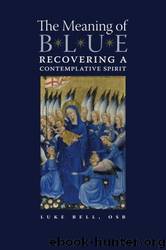The Meaning of Blue: Recovering a Contemplative Spirit by Luke Bell Osb & The Earl Of Oxford

Author:Luke Bell Osb & The Earl Of Oxford [Osb, Luke Bell & Oxford, The Earl Of]
Language: eng
Format: epub
ISBN: 9781621380825
Amazon: 1621380823
Publisher: Second Spring Books
Published: 2014-10-26T23:00:00+00:00
PART THREE
Contemplating God
“And this is life eternal, that they might know thee
the only true God and Jesus Christ, whom thou hast sent.”
199
The Meaning of Blue
200
Chapter Seven:
The Father of Mercies
Beginning Again
t may seem that everything has now been said. We have
seen how human perception has become dulled in its
beholding of nature and its listening to the word, and
Ihow God in His Providence has used these in a special
way to lead humanity back to Him. Yet equally it could be argued that nothing has yet been said: I have only been dealing with means of knowing God, whether natural or sacred, and have not touched on the direct contemplation of God as He is in Himself. Indeed, I could repeat what I said at the start of Chapter Five when first broaching the subject of Scripture: it would be entirely reasonable to start a book about contemplation here, bypassing everything that has been said and beginning with the direct gaze toward God as He is in Himself. Indeed, many books about contemplation do start at this point.
The more discerning of these books, however, assume at least a familiarity with Scripture, liturgy, and the sacraments. And the best writers on these subjects would not presume to be able to wrap them up so as to preclude them from opening into the mystery of God in ways beyond the ken of their discourse. The truth is that both what has been discussed already in this book and what has not yet been discussed are needed. In finishing what I have written, I am beginning what I have to write. Let me explain why.
If we trust to our celebration of the liturgy to bring God to us, we are in the position of those mentioned in the psalm that says, “Some trust in chariots, and some in horses.” That is to say, we have substituted means for end. The psalm goes on, “But we will remember the name of the LORD our God.” Significantly, the Name of the Lord could not ordinarily be spoken: the tetragrammaton was too sacred for utterance. This conveys the truth that God is beyond human 201
The Meaning of Blue
speaking. If we say our liturgical celebration has got Him nailed up in a box, there is no truth in us. Nature after the Fall became opaque for Man, who allowed it to replace for him what it was intended to convey, as though mistaking an envelope for the letter inside it.
Chapter Four explained how a further such fall is conveyed in the story of the tower of Babel: here a cultural or language system becomes the absolute, the name Man makes for himself, replacing the Name of the Lord. It is entirely possible for this opacity, this replacing of meaning with means, to happen with regard to the explicitly sacred. I have already commented, in Chapter Five, on how the Bible cannot be a closed system. Neither can the liturgy or the sacraments. If they are merely self-referential, they are closed to the divine.
Download
This site does not store any files on its server. We only index and link to content provided by other sites. Please contact the content providers to delete copyright contents if any and email us, we'll remove relevant links or contents immediately.
The 5 Love Languages: The Secret to Love That Lasts by Gary Chapman(9789)
The Space Between by Michelle L. Teichman(6929)
Assassin’s Fate by Robin Hobb(6199)
Wiseguy by Nicholas Pileggi(5770)
Everything Happens for a Reason by Kate Bowler(4734)
Gerald's Game by Stephen King(4641)
Pillow Thoughts by Courtney Peppernell(4271)
A Simplified Life by Emily Ley(4158)
The Power of Positive Thinking by Norman Vincent Peale(4062)
Harry Potter and the Prisoner of Azkaban (Book 3) by J. K. Rowling(3350)
Resisting Happiness by Matthew Kelly(3337)
Girl, Wash Your Face by Rachel Hollis(3282)
Being Aware of Being Aware by Rupert Spira(3272)
The Secret Power of Speaking God's Word by Joyce Meyer(3180)
The Code Book by Simon Singh(3178)
More Language of Letting Go: 366 New Daily Meditations by Melody Beattie(3023)
Real Sex by Lauren F. Winner(3014)
Name Book, The: Over 10,000 Names--Their Meanings, Origins, and Spiritual Significance by Astoria Dorothy(2979)
The Holy Spirit by Billy Graham(2944)
